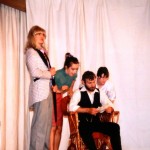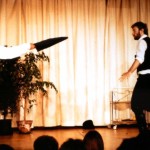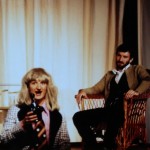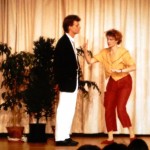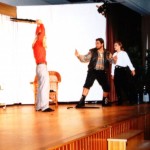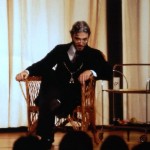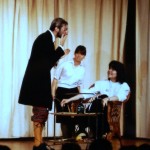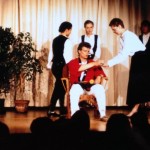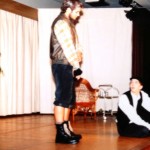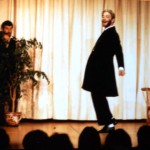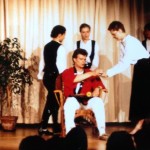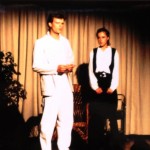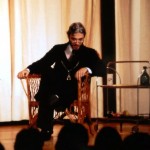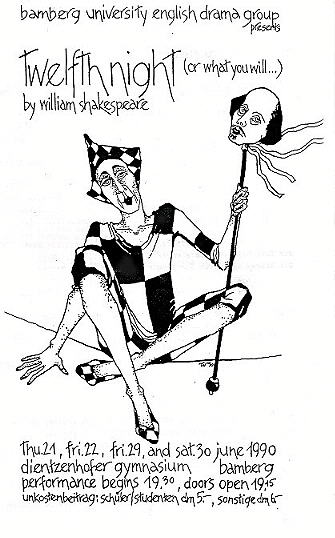
Twelfth Night - Those Were the Players
| Orsino, Duke of Illyria ................................................... | Stefan Hümmer |
| Curio ............................................................................. (attendants to the Duke) Valentine ....................................................................... |
Christine Rittmaier
Pia Vilsmayer |
| Two Officers in the Duke's Service ................................ | Sandra Ehlers |
| Christine Rittmaier | |
| Viola, later disguised as Cesario ..................................... | Sibylle Friz |
| Sebastian, her twin brother ............................................. | Mathias Gressmann |
| Captain of the wrecked ship, befriending Viola ............... | Sandra Ehlers |
| Antonio, another Captain, befriending Sebastian ........... | Lutz Reuter |
| Olivia, a countess of Illyria ............................................. | Beatrix Hesse |
| Sir Toby Belch, Olivia's Uncle ....................................... | Michael Ehrhardt |
| Sir Andrew Aguecheek, Sir Toby's companion .............. | Rainer Schlötterer |
| Malvolio, Olivia's steward .............................................. | Christoph Futschek |
| Maria, Olivia's lady-in-waiting ...................................... | Claudia Dechant |
| Feste, the clown jester to Olivia ...................................... | Beate Steck |
| Fabia, a member of Olivia's household ........................... | Susanne Seehofer |
| Priest ............................................................................. | Jürgen Hoh |
| and as himself ............................................................... | Mike Claridge |
Twelfth Night - The Manipulators
| Musicians: (guitars) ................................................... | Michael Benker |
| (keyboards) ............................................. | Hans-Conrad Feiler |
| (recorders) ............................................... | Saskia Reich, Thomas Rödiger |
| Lighting ........................................................................ | Jürgen Hoh, Sandra Schmied |
| Make-up ...................................................................... | Isabella Weber |
| Costumes and props .................................................... | the Cast |
| Poster design ............................................................... | Tini Weidner |
| Video coverage ............................................................ | Manfred Haaß |
| Administration and correspondence ........................... | Andrea Faber |
Twelfth Night - The Title
| The play's full title, Twelfth Night, or, what You Will, has caused much ink to flow from learned pens. Contemporary references to the work and its first performance make no allusions to the actual date of Twelfth Night (Epiphany, or, in German, Heilige Drei Könige - 6th January). Thus, it is likely that the title was intended to give the idea simply of some festive occasion like that finishing the Christmas celebrations, one when revels and folly (Narrenfreiheit) were permitted to turn the world upside down under a Lord of Misrule.
Misrule, deception and illusions, the expected features of such an occasion, are represented in the play by Olivia's unruly household - Sir Toby, Sir Andrew, Maria, Feste and Fabia, but also Malvolio in his delusion - and, of course, by the whole business with Sebastian and Viola / Cesario. At the same time, there are countless indications within the text of the play that it is set in spring or even Summer. These reinforce the idea that Shakespeare meant not so much Epiphany but a general festival of foolery. „What you will" also reflects the mood of Twelfth Night celebrations, the idea of sentiment, frivolity, tricks, foolery and misrule - a mood, indeed, of whatever you would like. This concept of light-heartedness, of a lack of seriousness, is continued in one of the leitmotivs of the play, the phrase - as often voiced by Feste, among others - „that's all one"; live shouldn't be taken so seriously, since nothing - especially where unimportant things are concemed - is worth making a mountain out of a molehill about. lf there are differences of opinion, if problems occur, don't worry, because it doesn't really matter. And Shakespeare even uses this in the song that concludes the play, as if wishing to underline the very lack of seriousness of his work. |
Twelfth Night - The Plot
| While on a sea voyage, Viola and Sebastian are shipwrecked off the coast of Illyria. They come ashore separately, each believing the other to be drowned.
Orsino, Duke of Illyria, is anxious to win the affections of Olivia, a countess. She claims to be unable to consider his desires at present as a result ot her brother's recent death. Orsino, however, suspects - correctly - that she is using the period of mourning as an excuse to put him off; he also believes - incorrectly - that by constantly confronting her with his love for her, he will bring her round to his way of thinking. Hearing of Orsino, Viola decides to serve him, disguised as a man and under the assumed name "Cesario". This leads to problems: Orsino, pleased by "Cesario's" manner and appearance, sends "him" repeatedly to Olivia as his messenger, with the result that the Countess, throwing off her mourning and little knowing what "Cesario's" true nature is, falls in love with "him". In the meantime, Viola-in-disguise has herself fallen in love with Orsino. As might be expected, things become even more complicated when Sebastian - whose manner of clothing Viola has adopted for her disguise - arrives in the town. An inevitable confusion of identities develops. |
Twelfth Night - Some Questions
| Is Fabia(n) merely the bad side of Feste? Why does Shakespeare only twice - briefly - have them together on stage? Why does Maria suggest to Sir Toby and Sir Andrew that Feste accompany them in watching Malvolio find the letter - but then it is Fabia(n) who actually comes with them?
Why are there so many inconsistencies in the play (like the one above)? Was Shakespeare in a hurry?! Why didn't he make more of Sebastian's role (a thankless task tor any aspiring actor!!)? Is Twelfth Night in fact to be seen as a comedy? The main plot reveals little that could usefully be called „comic". How should the overall treatment and end of Malvolio be considered (and, indeed, performed)? His could be regarded as a tragic fate - yet he is basically a figure of fun, not to be taken seriously. Some leading critics refuse to classify the play as a comedy. How should it be viewed - what are we to leam from it? And WHY, OH WHY does Viola marry Orsino??!! (Michael Claridge)
|
Feste's Song
When that I was and a little tiny boy,
With a hey-ho, the wind and the rain;
A foolish thing was but a toy,
For the rain it raineth every day.
But when I came to man's estate,
With a hey-ho, the wind and the rain;
'Gainst knaves and thieves men shut their gate,
For the rain it raineth every day.
But when I came, alas, to wive,
With a hey-ho, the wind and the rain;
By boasting could I never thrive,
For the rain it raineth every day.
But when I came unto my bed,
With a hey-ho, the wind and the rain;
With tosspots still had drunken head,
For the rain it raineth every day.
A great while ago the world began,
With a hey-ho, the wind and the rain;
But that's all one, our play is done,
And we'll try to please you every day.
 © Another Discriminating Production 1990
© Another Discriminating Production 1990
Twelfth Night - and the Press said ...
| Die l2. Nacht Studentische Theatergruppe begeisterte Als Mann verkleidet unerkannt dem Geliebten zu dienen, für ihn um dessen Angebetete zu werben, die sich dann in den falschen Diener verguckt - was bleibt der armen Viola anderes übrig, als resigniert festzustellen: „It is too hard a knot for me t'untie!" Er löst sich am Ende natürlich doch - der ziemlich verworrene Knoten in Shakespeares Verwechslungskomödie „Twelfth Night". Viermal gab die English Drama Group der Universität Bamberg in der Aula des Dientzenhofer Gymnasiums das Schauspiel unter der Regie von Mike Claridge zum Besten - mit allem ,,what you will": Hinterlist und Betrug, Liebe, Anzüglichkeiten und viel Narretei. Der Anfang aller Verstrickungen ist der Schiffbruch, den die Zwillinge Viola (Sibylle Friz) und Sebastian (Mathias Gressmann) erleiden. Sie verlieren sich aus den Augen und jeder glaubt vom anderen, er sei umgekommen. Auf getrenntem Wege landen beide wohlbehalten an der Küste Illyriens. Viola verdingt sich - in Männerkleidung und unter dem Namen Cesario - bei Herzog Orsino (Stefan Hümmer). Sie verliebt sich in ihn, muß aber für ihn um seine Angebetete Olivia (Beatrix Hesse) werben. Auf die Lady - oder besser gesagt: auf ihr Vermögen - haben auch noch andere Gentlemen ein Auge geworfen: Ihr Haushofmeister Malvolio (Christoph Futschek) und der vertrottelte Sir Andrew. Olivia aber zieht Viola alias Cesario vor. Als Sebastian, der Viola bis aufs Haar gleicht, auftaucht, entsteht ein köstliches Chaos. Köstlich war die gesamte Aufführung der English Drama Group: Mit viel Bewegung und einem unwahrscheinlichen Spieltempo schafften es die Darsteller problemlos, das Publikum drei Stunden lang zu fesseln. Neben den „ernsteren" Rollen der unglücklich verliebten Viola, Orsino und Olivia bot besonders Beate Steck als quirlige Feste eine schauspielerisch reife Leistung: Sie schaffte es, die klugen Späße des Narren so herüberzubringen, daß sie sowohl Witz als auch die tiefsinnigeren Anspielungen bewahrten. Daß die Studententruppe aus Geldmangel auf historische Kostüme verzichtete, erwies sich nicht unbedingt als Mangel: Ein yuppiehafter Herzog Orsino im Tennisdress oder Zweireiher hatte auch seine Reize. Trotzdem war der Shakespeare der Group, die seit l984 in wechselnder Besetzung besteht, nicht modernisiert. Durch der kaum veränderten Text und nicht zu letzt durch die spätmittelalterlich anmutende Live-Musik, die von Studenten zum Teil selbst geschrieben wurde, behielt das Stück seinen ursprünglichen Charme. (Tanja Deuerling, UB Dialog 4/5, 1990)
|
Twelfth Night - Gratilities and Gratitude
We would like to thank:
- Ingeborg Peñalba and Prof. Jochum for the usual moral and administrative support, also for postage and copy cheques!
- The director of the Bamberger Schulamt and Herr Hopf of the Dientzenhofer Gymnasium, for permission to use the school’s premises again.
- Werner Oppelt for his invaluable intermediary skills, and the DECB for publicity support.
- The Stadtgärtnerei Bamberg and Michael Niedermaier, and the Seehofer family, for bushes.
- The University Presseamt.
- Herr and Frau Büttner of the D.G. for amazing patience in the face of total chaos (as ever...)!
- Wolfgang Lau for great actions with regard to poster distribution.
- Wolf-Dieter Müller for phenomenal assistance „beyond the line of duty" in connection with our posters.
- The Spracheninstitut Vincken for an essential port in a storm in connection with rehearsals.
Twelfth Night - Warum...
| ...inszeniert die English Drama Group schon wieder ein Shakespearestück, nur drei Jahre nach dem letzten? ...sind die Kostüme nicht historisch - oder mindestens angemessener für ein Shakespearestück?? ...führt die BUEDG immer mehr oder weniger leichte Stücke auf - haben die Mitglieder etwas gegen ernste Stücke oder Tragödien??? Die Antwort auf alle drei Fragen ist im Prinzip die gleiche, und sie kann mit einem Wort gegeben werden: Geld! Die Gruppe finanziert sich selbst und erhält keinerlei finanzielle Hilfe aus Universitätsmitteln im voraus. Die Mitglieder der Gruppe nehmen an einem Seminar des Lehrstuhls für Englische Literaturwissenschaft teil, aber stellen alle ihre Requisiten, Kostüme etc. selbst zur Verfügung, während der Erlös aus dem Verkauf der Eintrittskarten dafür benutzt wird, unsere Ausgaben abzudecken - Beleuchtungs- und sonstige Stromkosten für das Theater, Werbungskosten (unsere Poster sind meist unsere größte Ausgabe), Make-up sowie Kostüme und Requisiten, die der Gruppe insgesamt gehören. Es ist auch schon vorgekommen. daß die Ausgaben nicht vollständig durch den Kartenverkauf finanziert werden konnten. In diesem Fall muß der noch fehlende Betrag von den Mitgliedern der Gruppe selbst aufgebracht werden. Um es kurz zu sagen. die Gruppe ist keine gewinnmachende Organisation, sondern muß alles selbst finanzieren. Darin liegt also die Antwort auf die oben gestellten Fragen. Erstens ist es schwierig und teuer, traditionelle Kostüme zu bekommen oder selbst zu machen. Zweitens ist es finanziell unklug, im vorneherein zuviel auszugeben, bevor wir sicher sind, daß alles durch die Einnahmen abgedeckt werden wird - vor allem wenn man die Tatsache bedenkt, daß unsere Einnahmen normalerweise nur gerade unsere Ausgaben decken. Daher ist es zum Beispiel nicht ratsam, Kostüme zu leihen oder ein Stück eines unbekannten Dramatikers aufzuführen. Drittens ist es nach unserer Erfahrung so, daß das Bamberger Publikum weniger geneigt ist, ein englischsprachiges Stück zu besuchen, das entweder keine Komödie, oder unbekannt, oder sogar beides ist. Daher müssen wir auch weiterhin an unserer Politik festhalten - zumindest bis aufs weitere, vor allem dann, wenn wir ab und zu dazu in der Lage sein wollen, etwas besonders Ungewöhnliches anzubieten. Wir versuchen, zumindest für die Zukunft von der Universität unterstützt zu werden; jedoch würden wir uns sehr über Angebote von Firmen freuen, die uns vielleicht im voraus sponsern möchten. Als Gegenleistung könnten wir z.B. Werbefläche auf unseren Plakaten oder in unseren Programmen bereitstellen. (M.C.)
|







